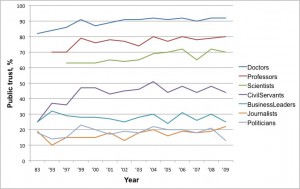One sometimes hears it said that there’s a “crisis of trust in science” in the UK, though this seems to be based on impressions rather than evidence. So it’s interesting to see the latest in an annual series of opinion polls comparing the degree of public trust in various professional groups. The polls, carried out by Ipsos Mori, are commissioned by the Royal College of Physicians, who naturally welcome the news that, yet again, doctors are the most trusted profession, with 92% of those polled saying they would trust doctors to tell the truth. But, for all the talk of a crisis of trust in science, scientists as a profession don’t do so badly, either, with 70% of respondents trusting scientists to tell the truth. To put this in context, the professions at the bottom of the table, politics and journalism, are trusted by only 13% and 22% respectively.
The figure below puts this information in some kind of historical context. Since this type of survey began, in 1983, there’s been a remarkable consistency – doctors are at the top of the trust league, journalists and politicians vie for the bottom place, and scientists emerge in the top half. But there does seem to be a small but systematic upward trend for the proportion trusting both doctors and scientists. A headline that would be entirely sustainable on these figures would be “Trust in scientists close to all time high”.
One wrinkle that it would be interesting to see explored more is the fact that there are some overlapping categories here. Professors score higher than scientists for trust, despite the fact that many scientists are themselves professors (me included). Presumably this reflects the fact that people lump together in this category scientists who work directly for government and for industry together with academic scientists; it’s a reasonable guess that the degree to which the public trusts scientists varies according to who they work for. One feature in this set of figures that does interest me is the relatively high degree of trust attached to civil servants, in comparison to the very low levels of trust in politicians. It seems slightly paradoxical that people trust the people who operate the machinery of government more than they trust those entrusted to oversee it on behalf of the people, but this does emphasise that there is by no means a generalised crisis of trust in our institutions in general; instead we see a rather specific failure of trust in politics and journalism, and to a slightly lesser extent business.

I wonder how long and what it would take for for the public to substantially change their minds?
Also – it seems I can’t leave a reply on older posts. I had a question regarding the catalytic conversion of CO2 to methanol which you mentionned a while back. It seems that if Industry used this technology, they would simply use the methanol to produce energy, reconverting it to CO2 – possibly offsetting the energy requirements of the building. Overall, the only thing you would be getting out of this process is energy. So what is the advantage of this vs. using solar cells to harness the sunlight? I find it hard to imagine that this process could be as efficient as photovoltaics… what do you think?
No doubt the trust level in a doctor is so high which should be the case.
The fact that caught my attention was the fact that there has been a increase in the trust level more or less in all sections. I feel thats a good thing, in the sense that people believe in their fellow beings. 🙂
Eric, it’s difficult to say at the moment whether photocatalytic reduction of CO2 would end up being more efficient or cheaper than photovoltaics.
Hitesh, all sections except politicians and business leaders, that is… but you’re right about the other sectors.